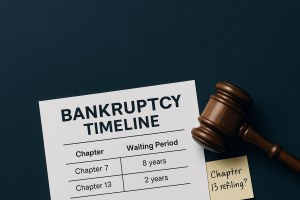
How Often Can You File for Bankruptcy? Full Timeline Guide
How often can you file for bankruptcy and still get a discharge? How often can you file for bankruptcy is
Error: Contact form not found.
Lorem ipsum dolor sit amet, consectetur adipiscing elit. Ut elit tellus, luctus nec ullamcorper mattis, pulvinar dapibus leo.
How often can you file for bankruptcy is a question many people ask after facing recurring financial troubles. Filing more than once is legal, but timing rules and discharge limits matter. Understanding those rules can help you plan ahead and better understand your available options.
Filing for bankruptcy again depends on which chapter you previously filed and which one you’re considering now. Here’s how it breaks down:
These waiting periods are tied to discharge eligibility. You can technically file again sooner, but you may not be able to wipe out any debt unless the waiting period has passed.
Sometimes life hits hard more than once. If you’ve filed before and find yourself overwhelmed again, you’re not alone. Here are common reasons why people file again:
Even if you’ve used bankruptcy before, it may still be an option depending on your current situation. Just be sure to assess the legal timing rules first.
Filing too soon doesn’t stop you from going to court, but you may not receive a discharge, which is the legal elimination of your qualifying debts. That means:
It’s also important to note that if the court believes you’re abusing the system by filing too often, your case could be dismissed. Always consult with a professional before filing again.
Each bankruptcy you file leaves a mark on your credit history. A Chapter 7 stays on your record for 10 years, while Chapter 13 remains for 7 years. Filing multiple times can make it harder to:
That’s why timing and financial planning are important considerations before choosing to file again.
You now know how often you can file for bankruptcy and how important the legal timeframes are. Whether you’re considering Chapter 7 or Chapter 13, make sure you’re eligible for a discharge. Filing too soon could leave you without eligibility for a discharge.
If you’re wondering how often can you file for bankruptcy, speaking with a legal professional may help clarify the timing rules. Understanding the timing rules and discharge limitations is key to protecting your finances.
Contact Bankruptcy Attorneys today for a free evaluation to discuss when you may be eligible to file again and review general legal options.
Yes, but you likely won’t receive a second discharge if you file Chapter 7 or Chapter 13 again too soon.
You typically must wait 6 years, unless you repaid most of your debt in your previous Chapter 13 case.
Yes. Each filing negatively impacts your credit and stays on your report for 7–10 years.
You can still file, but you won’t receive a discharge. That means your debts will remain legally collectible.
No, there’s no lifetime limit—but each filing must follow court rules and waiting periods.
Attorney Advertising. This site is a legal marketing service and does not provide legal advice. Submitting information does not create an attorney-client relationship. Results are not guaranteed.

How often can you file for bankruptcy and still get a discharge? How often can you file for bankruptcy is
| Cookie | Duration | Description |
|---|---|---|
| cookielawinfo-checkbox-analytics | 11 months | This cookie is set by GDPR Cookie Consent plugin. The cookie is used to store the user consent for the cookies in the category "Analytics". |
| cookielawinfo-checkbox-functional | 11 months | The cookie is set by GDPR cookie consent to record the user consent for the cookies in the category "Functional". |
| cookielawinfo-checkbox-necessary | 11 months | This cookie is set by GDPR Cookie Consent plugin. The cookies is used to store the user consent for the cookies in the category "Necessary". |
| cookielawinfo-checkbox-others | 11 months | This cookie is set by GDPR Cookie Consent plugin. The cookie is used to store the user consent for the cookies in the category "Other. |
| cookielawinfo-checkbox-performance | 11 months | This cookie is set by GDPR Cookie Consent plugin. The cookie is used to store the user consent for the cookies in the category "Performance". |
| viewed_cookie_policy | 11 months | The cookie is set by the GDPR Cookie Consent plugin and is used to store whether or not user has consented to the use of cookies. It does not store any personal data. |